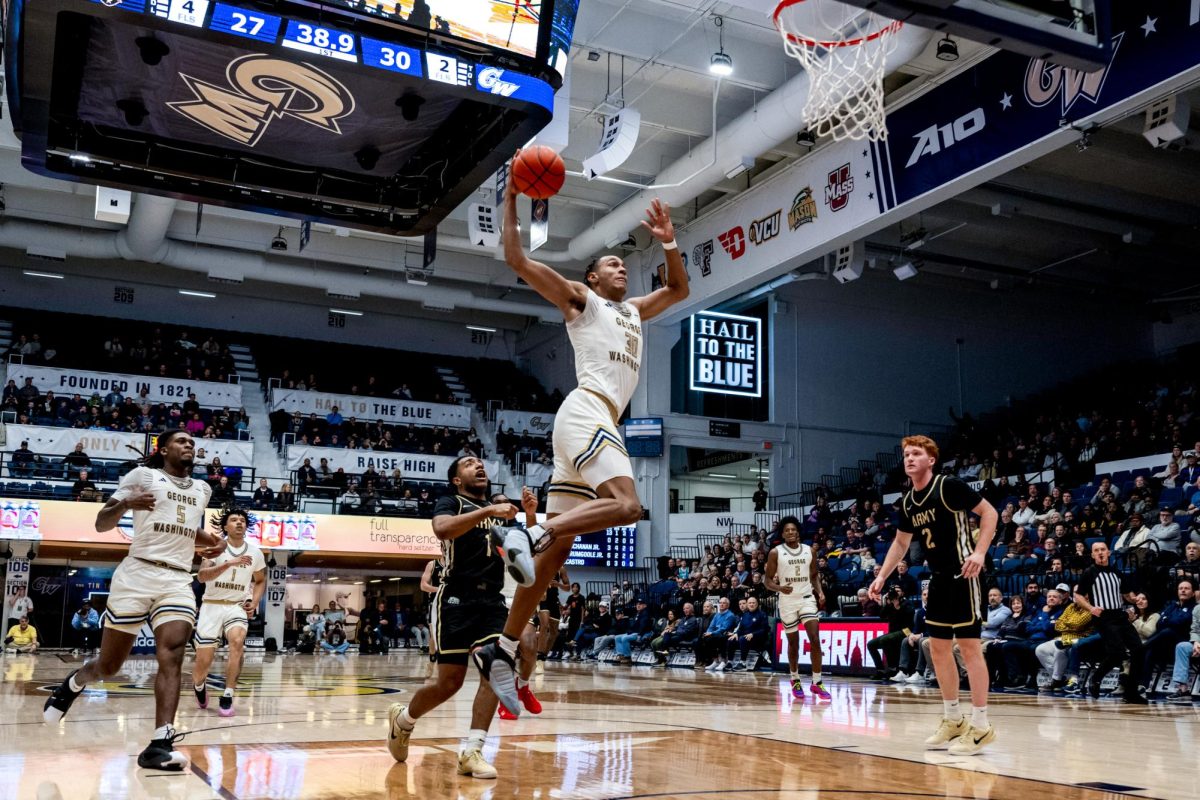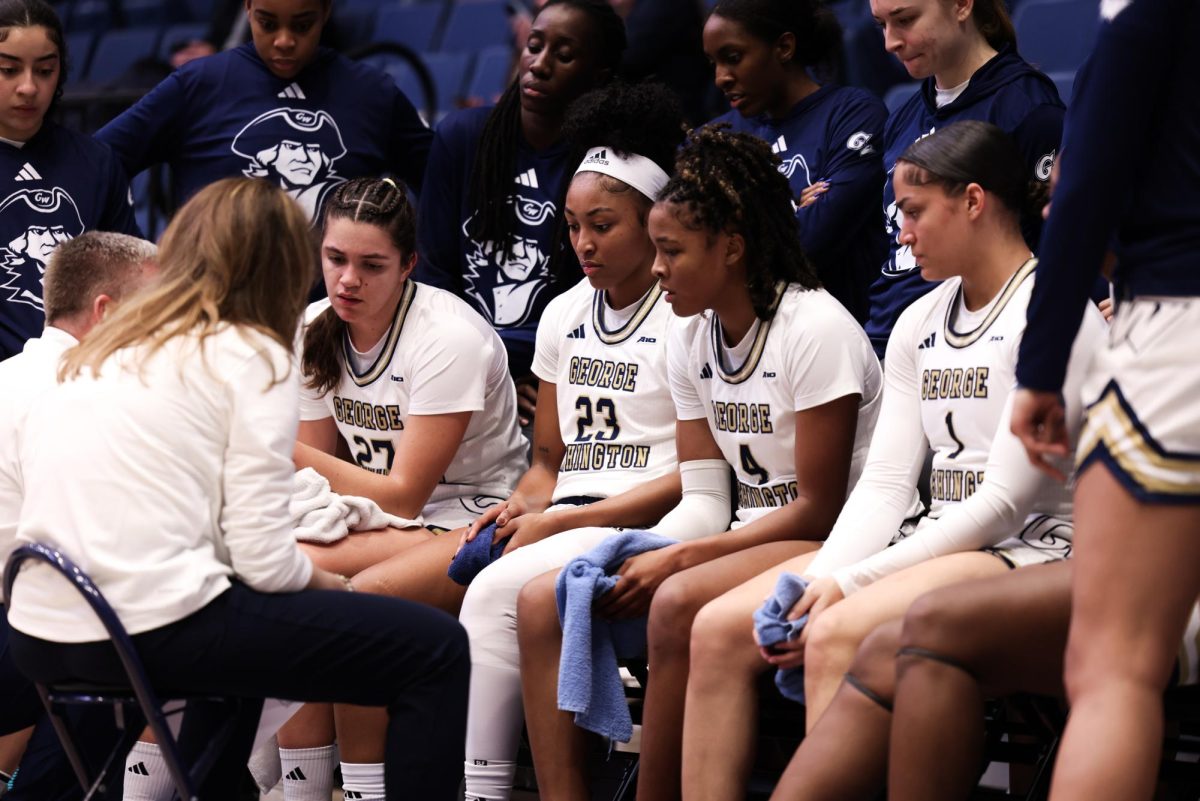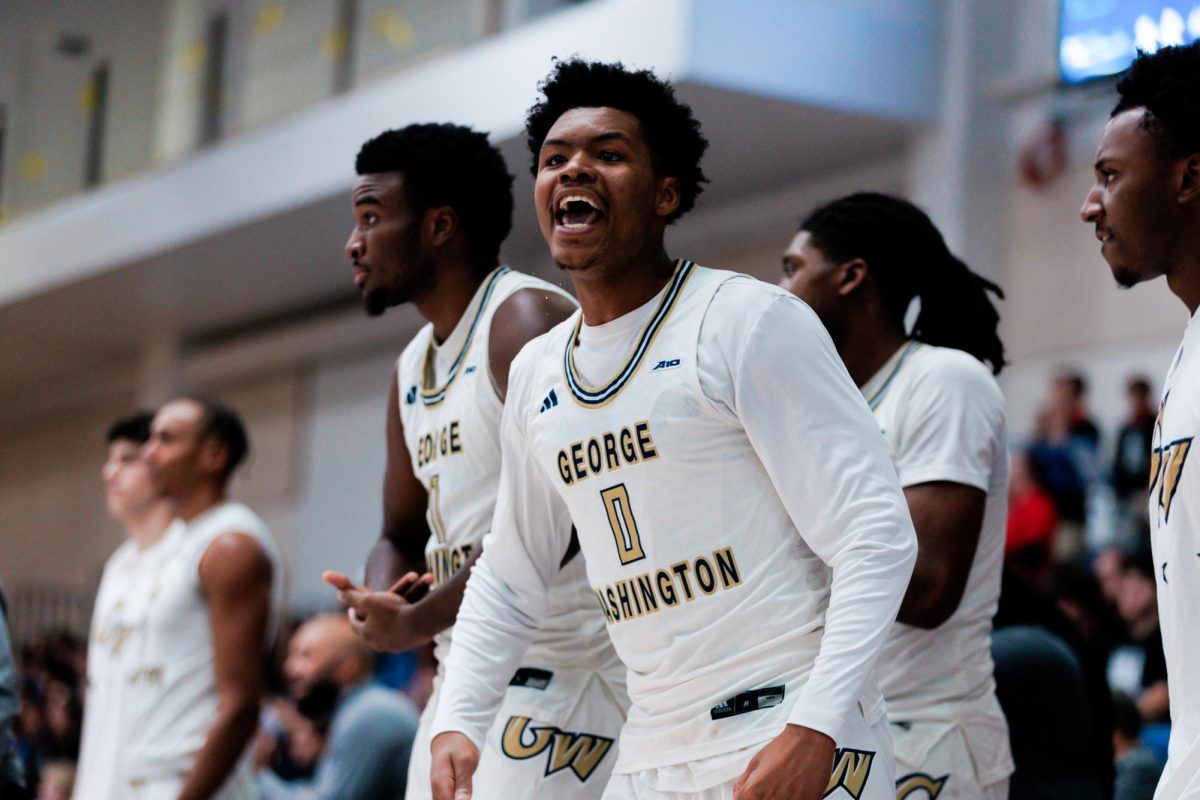In the end, what will likely be the Colonials’ final game could have been any other game of the season.
It had all the elements of GW’s play that frustrated its players and head coach all season long: opponent scoring runs and a lackluster first half contributing to a large deficit; shooting struggles stopping the Colonials from closing the gap; a stronger second half effort that fell apart with just minutes to go.
The team’s silent walk onto the bus could have been mistaken for one after any loss this season, except it wasn’t. It was the final one after a 67-50 defeat that Dayton handed the Colonials (10-21) in the first round of the Atlantic 10 tournament. Barring an invitation to a postseason tournament, it was the last time this group of players would take the court together.
“The game was kind of typical of our season. We get down a lot, we fight to come back, plenty of time, plenty of timeouts and we just make a bad play,” head coach Mike Lonergan said. “It was kind of our season in a nutshell there.”
It’s been five years since GW has won an A-10 tournament game. The last time the Colonials won, they won it all, walking away with the championship title in 2007.
For four of those five years, senior guard Tony Taylor wore a Colonial uniform, working steadily to rise to the top of the team. He exits as the 19th leading scorer in program history, and without ever making a trip to Atlantic City. After the buzzer sounded on what was probably his last 40 minutes as a Colonial, Taylor sat on the floor outside GW’s locker room, staring at a spot on the carpet.

“It’s never how you want to go out. Especially on a loss, first round, haven’t been to [Atlantic City],” Taylor said. “It’s a tough loss. I didn’t play well. I didn’t really help my team. It’s just hard. Hard for me to really go about anything right now.”
Taylor wasn’t the only Colonial to struggle at the net. He scored just six points on the game, not the kind of statistic the guard wanted as the punctuation mark on his GW career.
The Colonials only put up 17 points over the first 20 minutes of play, their second-worst first half of the season. The team ended the game shooting 34.5 percent from the floor and just 21.4 from long range.
“We shot 46 percent the last game, Saturday, and here we shot 34 percent, including 21 percent from threes,” Lonergan said. “You can play all the defense you want, but you’ve got to score more than 50 points.”
It was a big hole at halftime but GW wasn’t daunted, Lonergan said. The team seemed to put it all together early in the second, doubling down on its efforts to open play after the break on a 11-4 scoring run. It was capped by a Taylor steal, which he took the other way before dishing to junior guard Lasan Kromah, who laid the ball in to pull the Colonials within five. That was as close as GW would come.
The difference was effort, junior forward David Pellom said. Over that stretch of play, the Colonials had the effort, had the spark they needed to overcome the Flyers. Pellom, who earned his fifth double-double in six games with 18 points and 10 rebounds, gave arguably the best effort of any Colonial Tuesday night. It was a spark for the GW – but not one that lasted.
“Our effort. We wanted it. You could tell, that little spurt that we had. We wanted to win the game,” Pellom said. “After we came out of halftime, we had a little talk. Everybody just came together and just worked hard.”
While GW couldn’t get going on the offensive end, Dayton figured out the Colonials’ defense, keeping them from effectively shutting down the Flyers’ shooting. After Dayton posted its season-high in three-point shooting against GW Saturday, Lonergan prepared to shut the Flyers down from long range in the rematch.
And as play opened, with the Colonials in an aggressive man-to-man defense, Dayton’s 3-point percentage dropped to 16.7 in the first half. But the Flyers simply went inside, dribbling through GW’s defenders to get easy shots at the net. So Lonergan made the switch to the high-energy full-court press, an approach that was responsible for Dayton’s stumble at the beginning of the second.
It was an effective maneuver – one stretch of play saw the Colonials cause two turnovers in a row, earning them three straight possessions. But it required so much effort, from a team that couldn’t afford to tire its roster, Lonergan said, that GW just couldn’t maintain it for all of play.
“That’s why we kind of got out of it. Tony, he was tired the whole game. [Junior forward] Dwayne [Smith] was playing a lot of minutes, he was tired. David is kind of nursing a bad knee,” Lonergan said. “We can’t really stay in it, tried to go 1-3-1 a little, just gave up too much. All year, you go down 15 points, some games 20, it just takes so much energy to come back. Especially against good teams on the road. And we’re dying. And maybe that’s why we’re struggling to score.”
The final buzzer closed another kind of chapter for GW’s program, as well. It marked the end of Lonergan’s first Atlantic 10 season as head coach of the Colonials.
“We haven’t been past the first round, or even in it. This is five years in a row now we’ve lost in the first round and not even made the tournament. I just think we’ve got to change the mentality. Winning breeds winning. When you’re not a good team, the breaks don’t go your way,” Lonergan said. “We’ve got to get everyone working harder in our program. And the kids we recruit, that’s going to be the mentality. That it’s all about winning, and we’re going to do things that it takes to win.”






